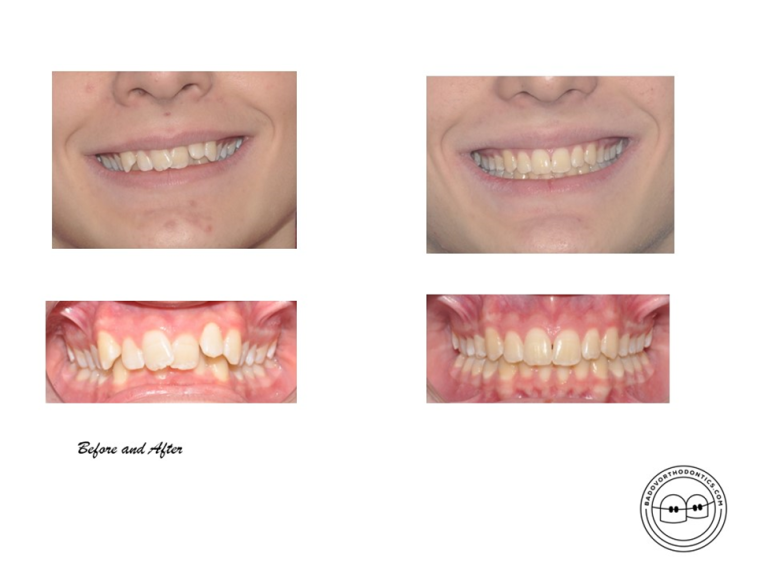What is an orthodontist?
It must be said that there is a huge difference between the terms “dentist” and “orthodontist”. While a dentist is a general practitioner, an orthodontist specializes in treating specific dental problems related to bite and teeth straightening.
However, an orthodontist is a dentist who has completed additional training to become a specialist. Orthodontic training posts are available in every country and we could refer to them as an orthodontic school. Throughout the duration of the training, dental specialists are able to provide orthodontic treatment to patients under the strict supervision of registered specialists in orthodontics.
What does an orthodontist do?
The orthodontist is an oral healthcare provider specializing in orthodontic treatments of dentofacial deformities and improper bites. With the help of dental appliances such as fixed braces and invisible braces we treat crowded teeth and irregular bite patterns. Dental irregularities can affect both the adult teeth and the deciduous teeth.

If you want to know more about what is orthodontics, we should say that it is a field of dentistry that deals with different subjects.
It includes the following:
- Growth and development of the facial skeleton and cranial base;
- Biology of tooth movement;
- Diagnosis of the deviations from the normal occlusion in all three dimensions;
- Biomechanics;
- Application of specific diagnostic tools;
- Correction of dental and skeletal discrepancies.
The profession is closely related to other dental specialists and usually requires teamwork. For example, before we initiate an orthodontic treatment, we would like to ensure that there is no active oral pathology and that there is good oral health throughout the orthodontic course of braces or aligners treatment.
During the initial free consultation we learn what is causing discomfort to the patient and what is his or her chief concern.
Some patients with overcrowded teeth may find maintaining acceptable oral hygiene challenging. For these people, having straight teeth could not only facilitate restorative dental procedures but also help them maintain better oral hygiene. Last but not least, proper tooth alignment could improve the person’s self-esteem.
We collaborate with oral surgeons, periodontists, prosthodontists, pediatric dentists and other colleagues. We perform a thorough clinical orthodontic assessment of the presented malocclusion, gather the necessary clinical records and create a treatment plan to address the patient’s chief concern.
After a discussion with the person sitting in front of us, we decided which treatment modality would best meet the patient’s expectations.

Paediatric dentistry and maxillofacial surgery are probably the two specialities that both dentists and orthodontists should have а special interest in. The vast majority of our patients are actively growing, and for most of them, growth modification treatment approaches could be applied.
However, severe skeletal class II after the age of 18 can be treated with fixed braces and lower jaw surgery. This is one reason why orthodontists collaborate with oral and maxillofacial surgeons.
Difference between dentist and orthodontist
Every dentist could limit their practice to orthodontic treatment of crooked teeth. In most countries, you do not have to be a specialist in orthodontics to provide orthodontic care to your patients. We all need to graduate from dental school and obtain a dental license in order to be able to treat patients.
I have met and know a lot of general dentists who successfully provide orthodontic care in their private surgeries, and they have an excellent reputation in their community. To be successful, I assume they apply very strict case selection protocols and do not deal with highly complex clinical cases.
The main difference between a dentist and an orthodontic specialist is that the second has to apply for an orthodontic training post, be accepted and complete a formal training. That career path usually requires an additional three years of further training.
During the specialist training, we provide orthodontic care to patients under the strict supervision of orthodontists, and that gives us the chance to gather valuable clinical and theoretical experience, which is necessary to deal with the most complex clinical cases.
Orthodontists usually work and collaborate closely with plastic, oral, and maxillofacial surgeons and other colleagues to handle different jaw deformities, irregular bite patterns, facial and dental asymmetries, and deviations from normal occlusion.
How to become an orthodontist?
As I have already mentioned, you can provide high-quality orthodontic care to your patients without being a specialist. You just have to attend high-quality courses that will give you the fundamentals you can rely on.

However, if you are willing to apply to an orthodontic residency program, which is basically an orthodontic school, there are usually several requirements that you have to meet. It is a competitive procedure, and your professional experience will be considered.
If you apply for a program at your dental school, you probably have to be at the top of your class with a special interest in dental research, as evidenced by recognised dental journals.
The available places are few, and the admissions committee takes into consideration additional qualifications such as a Master’s degree or PhD. If you have one of those, your chances for acceptance could be extremely high.
An additional qualification from one of the Royal College of Surgeons gives a particularly good impression. It shows that you have the desire and motivation to expand your knowledge beyond undergraduate dental training and consequently become even better at your job. Many colleagues usually pass the MFDS RCSed or equivalent exam before applying for a training position.
In my case, I applied for orthodontic specialist training outside of Bulgaria. Upon completing my training, I had to pass the exams in Bulgaria to become an orthodontist. While working in Ireland as a registered specialist, I applied for membership in the Orthodontics exam at the Royal College of Surgeons of Edinburgh. I was allowed to sit the exam, and I passed it.
Benefits of a job as an orthodontist
There is tremendous satisfaction when a dentist completes an orthodontic treatment and the patient has a beautiful and healthy smile. I think that is a great benefit in providing orthodontic care to our patients.
Most patients are bothered by the appearance of their overcrowded upper and lower teeth. However, when the braces are off, people appreciate that we have also improved their bite, not only their front teeth.
An additional benefit of being an orthodontist is the fact that you could teach undergraduate students if you decide to become a faculty member. Usually, that involves additional scientific work beyond your obligations as a clinical instructor.
If you are passionate about dental research and want to combine it with your work as a clinician, that is your optimal career path. Last but not least, you could apply for a hospital position (if you have those available in your country) and collaborate with surgeons to treat the most challenging clinical cases.

How much does an orthodontist make for orthodontic treatment?
That is a question that a lot of people would ask.
Their work conditions determine the salary of the orthodontist. For example, there is a huge difference between being employed and being self-employed with your own dental office. If you have a governmental position, your salary would be fixed and determined by your employer.
Additional bonuses could apply. If you work as an associate in a dental clinic, your salary will be determined by the amount of clinical cases under your supervision and care. Based on your experience, working days per week and work conditions, you would expect a gross salary of five or six figures per year.
FAQs
What exactly does an orthodontist do?
Orthodontists focus their clinical time on treating misaligned teeth and improving overall dental health. They also facilitate restorative dental procedures.
Can I become an orthodontist just by completing orthodontic courses?
You can gain additional skills as a dentist, but you can not become a specialist unless you complete a recognized postgraduate training program.
Does the orthodontist only treat crooked teeth?
Treatment of crowded teeth and improvement of jaw discrepancies are the main focus of our job.








